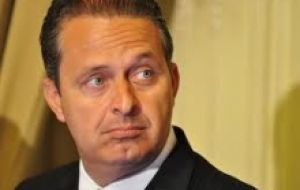MercoPress. South Atlantic News Agency
Brazilian presidential hopeful steps down from Rousseff’s coalition
 Pernambuco governor Eduardo Campos was the most highly rated in a recent poll
Pernambuco governor Eduardo Campos was the most highly rated in a recent poll Eduardo Campos, one of Brazil's most popular state governors, came one step closer to a presidential bid this week when his party withdrew from President Dilma Rousseff's seventeen parties’ coalition government. The Brazilian Socialist Party decided to pull its two ministers from Rousseff's cabinet to give Campos freedom to run in elections in October 2014.
By giving up the two ministries, even though the party will continue to support Rousseff in Congress, the Socialists will be less beholden to her ruling Workers' Party during an expected campaign for the top job.
Campos, the successful governor of the north-eastern state of Pernambuco, a historically poor state that grew faster than the national average during Brazil's recent decade-long boom, rose to national prominence with his party's strong showing in municipal elections last year. He has been considering a run for the presidency since then.
“The desire of the party today is to have its own candidate,” Campos told reporters after a meeting of PSB leaders, where they decided its ministers should resign.
Rousseff, who is widely expected to seek re-election, saw her popularity tank after massive street protests in June against poor public services, corruption and Brazil's high cost of living. But her approval ratings have begun to recover and she is the odds-on favourite among a relatively weak field of potential rivals.
Campos, 48, could combine his business-friendly message with support for popular poverty programs in Brazil's northeast, a traditional bastion of Rousseff's Workers' Party. A poll in July in Brazil's major 11 states found that Campos was the most highly rated governor.
One handicap, though, is his low name recognition nationally. A run in 2014 could help boost his profile, but Campos may have to wait until 2018 for a serious presidential bid.
A recent poll showed Campos running fourth in voter intentions with just 5.2%, compared to 36.4% for Rousseff, 22.4% for former environment minister Marina Silva and 15.2% for Aecio Neves, the leader of the main opposition party, the PSDB.




Top Comments
Disclaimer & comment rulesCommenting for this story is now closed.
If you have a Facebook account, become a fan and comment on our Facebook Page!